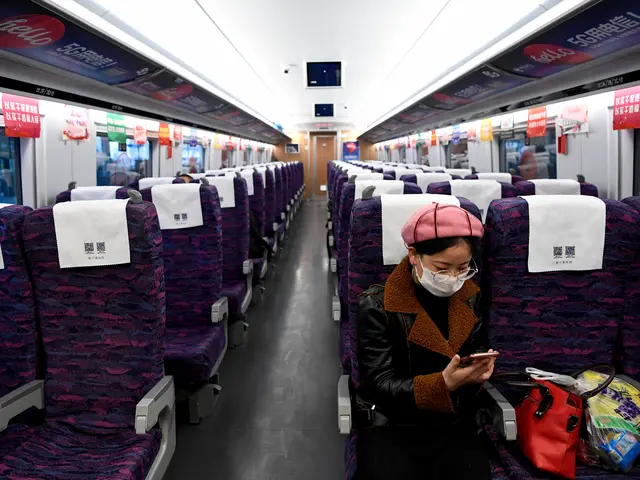Before dawn, Chen Yijun and his family were on the road to the airport. They'd been living away from their hometown for two years, and it was their first time to fly.
Marking the day of "Jingzhe" or "Awakening of Insects," it was the third of 24 solar terms on China's Lunar Calendar. Although the novel coronavirus disease (COVID-19) outbreak was not over, Chen was finally returning to work after two months.
At noon the day before, the family had left their hometown, a village in southwest China's Chongqing Municipality, to catch their flight. Going by car, bus and taxi, it took more than five hours to get to the airport. They stayed in a nearby hotel that night.
Along the way, people wearing protective clothing and masks took the temperatures of passengers at many points, Chen said.
On the taxi ride to the airport, he noticed the front and rear seats were separated by a plastic screen to reduce direct contact between the driver and passengers. On the screen was a slogan of support for Wuhan, the epicenter of the COVID-19 outbreak, he recalled.
"In the car, there was estrangement, but not a lack of compassion."
On the almost full aircraft, Chen filled in a registration card with his personal information, including name, job, address and phone number. "If someone on the plane has COVID-19 symptoms later, the authorities can inform me quickly. It's reassuring," Chen said.
He felt relief as he neared the end of his journey.
"According to the government's instructions, we have to be isolated for 14 days at home before going back to work."
But it was better than staying in his hometown, where no job meant no income, said Chen, who needs the money to support his two small children.
While fighting the epidemic, China is also actively promoting an orderly return to work and creating a social and economic environment that can help prevent and control the epidemic.
More than 90 percent of workers in major industries in most major industrial provinces are now back at work, according to official estimates. The rate is over 95 percent in the southern Guangdong Province, where Chen works.
Chen is an electrician on construction sites in Shenzhen. He lives in a rented house with his wife, Yang Yalan, and kids.
Yang takes care of the children at home and cooks for the family. She often makes short videos of the family's daily life and posts them on video-sharing app Douyin, also known as TikTok. She has almost 4 million fans.
Two months ago, the family trekked more than 1,400 kilometers to their hometown for the Lunar New Year. The COVID-19 outbreak disrupted their original plan to return to work after a month.
"From Jan. 27, the roads into our town were closed and guarded by residents every day," recalled Chen, who had no idea how long the closure would last.
"In such a situation, we have to follow the instructions of the government, who will surely consider us."
Fearing he might lose his income for a long time, Chen called his colleagues and boss to ask them to help him resume work as soon as possible, but transport and work sites were all shut down.
"My boss was also trapped in his hometown and had no way back to work," he said.
Chen joined the village WeChat group, where the local cadres shared the latest progress of the epidemic, as well as information on employment and production every day.
The town was disinfected every morning, and no one from outside ever came. Due to the controls and the cooperation of residents, no one in the town of over 20,000 people was infected with COVID-19.
"People in the town still wear masks outside, but they're less nervous than before," said Chen.
As conditions improved, the roads were reopened. After five days, transport between the town and the city resumed.
But Chen didn't rush back to Shenzhen. Considering a long train trip might increase the risk of infection for his children, he chose to go by plane when the air fares were cheapest.
"The kids didn't realize the severity of the epidemic, but I told them to wear masks, so they always did," Chen said.
On March 5, his wife shared a video on Douyin, showing the family had finally arrived at their house in Shenzhen.
"For the next few days, I will stay home and isolate myself, and wait for the call from my boss to return to work," Chen said.
 简体中文
简体中文



